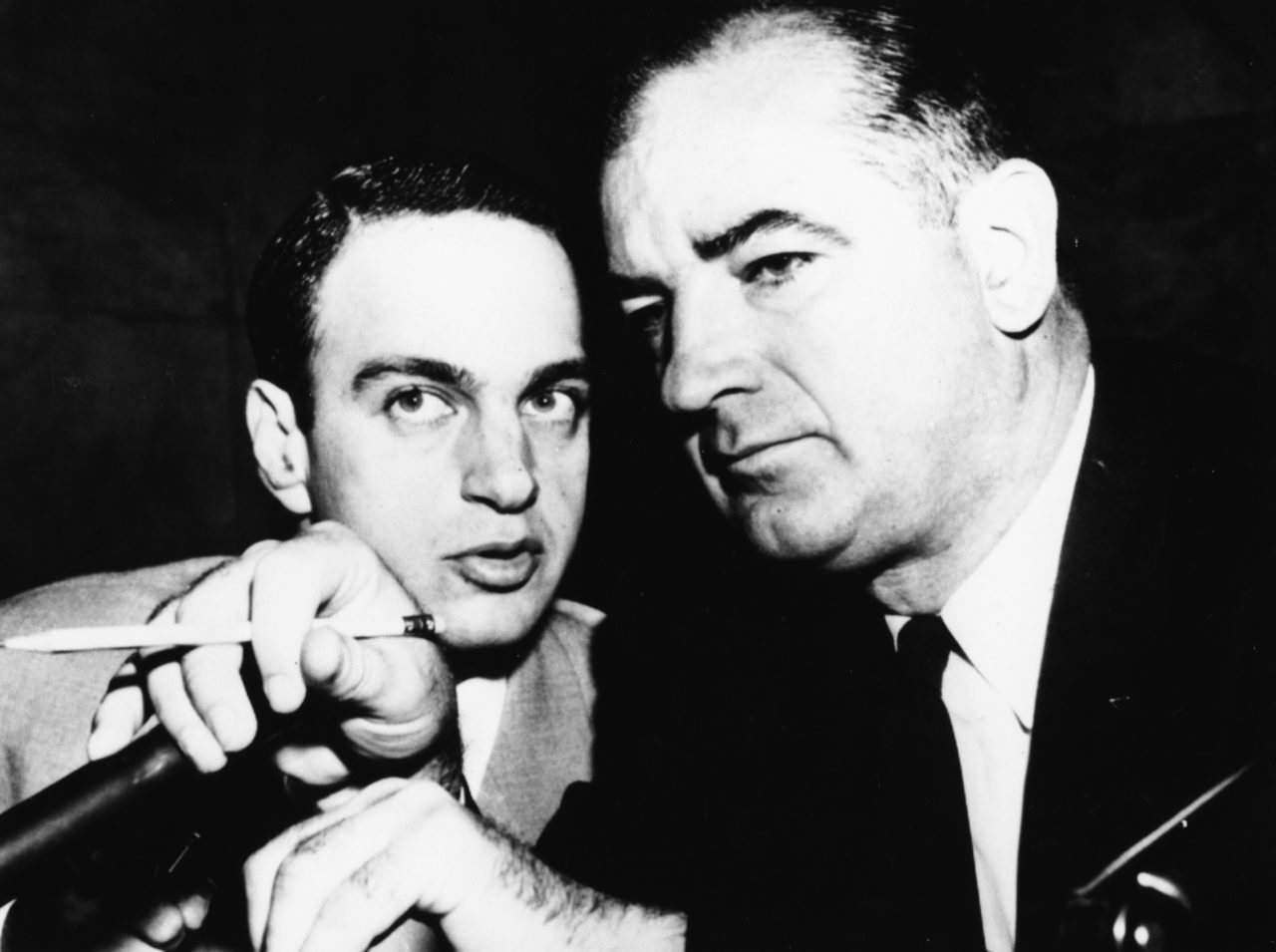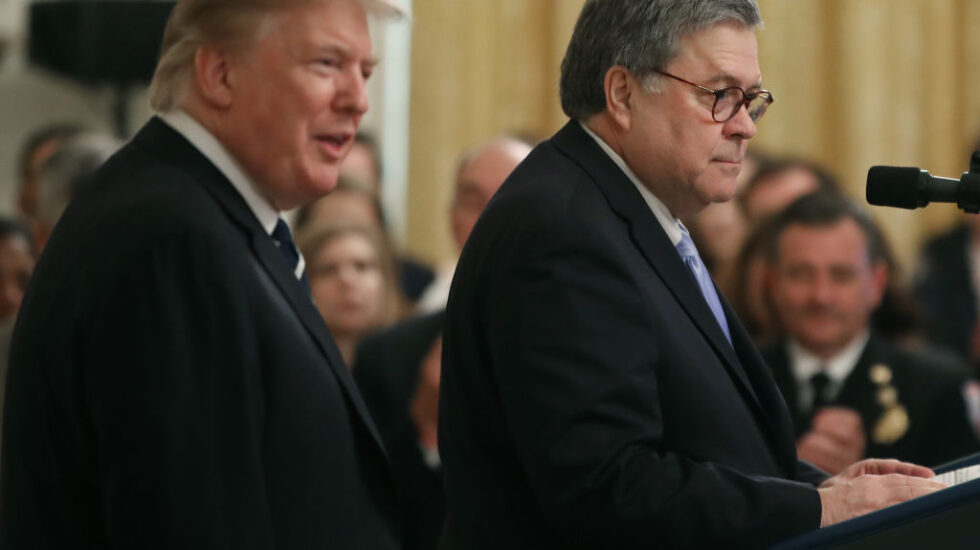“Where’s my Roy Cohn?” Trump yelled in frustration. Attorney General Jeff Sessions had recused himself from the Russia investigation and was no longer able to protect him. (Mueller Report, Vol. II, pp. 50, 110) He may have found him, again.
Roy Who?
From 1974 until shortly before his death in 1986, Cohn represented Trump. But in the early 1950s, he was Sen. Joseph McCarthy’s (R-WI) hatchet man. Their unfounded attacks on “communist sympathizers” ruined lives.

Attorney Roy Cohn talking to American senator Joseph McCarthy (right), circa 1954. (Photo by Keystone/Hulton Archive/Getty Images)
Fellow Republicans in Congress remained silent accomplices until televised hearings accelerated McCarthy’s demise. Sixty-five years ago today — on June 9, 1954 — attorney Joseph Welch’s response to his ad hominem attack on a young associate in Welch’s law firm resonated throughout the country:
“Until this moment, Senator, I think I never really gauged your cruelty or your recklessness… Have you no sense of decency, sir, at long last? Have you left no sense of decency?”
The audience erupted in applause. McCarthy and Cohn had crossed a line that GOP leaders could no longer ignore. Except for Rep. Justin Amash (R-MI), the 21st century iteration of McCarthy’s party has acknowledged no such line for Trump. But in Attorney General William Barr, Trump apparently has found his Roy Cohn, as recent Trump-Russia Timeline entries reveal.
Step 1: Barr Undermines Mueller
MAR. 5, 2019: Special counsel ROBERT MUELLER tells Barr and Rod Rosenstein that his report will not determine whether Trump obstructed justice.
MAR. 22: MUELLER’s report to Barr outlines serious evidence against Trump, but explains that charging him with a crime was never an option. Under the Constitution and a longstanding Justice Department opinion, it’s Congress’ job to address a sitting president’s misconduct. (Vol. II, pp. 1-2)
MAR. 24: BARR sends Congress a letter excerpting phrases from Mueller’s yet-to-be-released report. According to Barr, Trump did not obstruct justice because the facts are simply insufficient to establish the crime. In a single line, he dismisses constitutional concerns and the prior Justice Department opinion as irrelevant.
But Mueller’s report actually says that if the facts showed “that the President clearly did not commit of obstruction of justice, we would so state.” (Vol. II, pp. 1-2) Mueller’s report does not so state. And more than 1,000 former federal prosecutors who served during Republican and Democratic administrations have signed a joint letter stating that, for anyone other than a sitting president, the facts in Mueller’s report would “result in multiple felony charges for obstruction of justice.”
MAY 29: MUELLER issues his first public statement since his appointment as special counsel. He reiterates that the Constitution and Justice Department policy prevented him from indicting a sitting president, but the facts prevented him from exonerating Trump.
MAY 31: BARR gives a folksy television interview during which he throws Mueller under the bus: “The [Justice Department] opinion says you cannot indict a president while he is in office, but [Mueller] could’ve reached a decision as to whether it was criminal activity….”
Yet it was precisely the prospect of a criminal accusation without a subsequent process for potential vindication that Mueller viewed as triggering constitutional and fairness concerns. (Vol. II, pp. 1-2)
Barr adds, “[W]e didn’t agree with the legal analysis — a lot of the legal analysis in the report. It did not reflect the views of the department. It was the views of a particular lawyer or lawyers and so we applied what we thought was the right law….”
One member of Mueller’s team, Deputy Solicitor General Michael Dreeben, is among the nation’s top constitutional criminal lawyers. Barr has yet to explain what Dreeben and Mueller got wrong, what “right” law Barr and Rosenstein applied, or what legal reasoning led them to exonerate Trump where Mueller reported that the facts made exoneration impossible.
Step 2: “Investigate the Investigation”
In the same interview, Barr discusses a long time Trump distraction: investigating the origins of the Trump counterintelligence probe. Echoing McCarthy-Cohn tactics, he offers no factual support and relies on ambiguity and innuendo to cast a sinister shadow:
- “[T]he use of foreign intelligence capabilities and counterintelligence capabilities against an American political campaign to me is unprecedented and it’s a serious red line that’s been crossed.”
- “Counterintelligence activities that were directed at the Trump campaign were not done in the normal course and not through the normal procedures….”
- “I have not gotten answers that are, well, satisfactory, and in fact probably have more questions, and that some of the facts that–that I’ve learned don’t hang together with the official explanations of what happened.”
- “I think the activities were undertaken by a small group at the top… It was done by the executives at the senior level. Out of headquarters….”
Barr chastises journalists for not amplifying Trump’s “investigate the investigation” narrative: “[T]he media doesn’t seem to think that it’s worth looking into. They’re supposed to be the watchdogs of, you know, our civil liberties.”
Step 3: All-In And No Regrets
Finally, Barr suggests that Trump’s critics are the norm-busters, not Trump:
“I think one of the ironies today is that people are saying that it’s President Trump that’s shredding our institutions. I really see no evidence of that…. [C]hanging the norms on the grounds that we have to stop this president, that is where the shredding of our norms and our institutions is occurring.”
Asked about defending Trump personally at the expense of his own reputation and his duties as the nation’s attorney general, Barr says he doesn’t care:
“[E]veryone dies and…I don’t believe in the Homeric idea that you know, immortality comes by, you know, having odes sung about you over the centuries, you know?”
It’s true. Everyone dies. Roy Cohn died in disgrace after being disbarred. Donald Trump is the only one singing odes to him.
This is the ninth in a series of posts by Steven J. Harper on the Mueller report. The first eight installments are available here, here, here, here, here, here, here, and here. Steve is the creator and curator of the Trump-Russia Timeline appearing at Dan Rather’s News & Guts and at Just Security. He’s an attorney, adjunct professor at Northwestern University Law School, and author of four books, including Crossing Hoffa — A Teamster’s Story (Chicago Tribune “Best Book of the Year”) and The Lawyer Bubble — A Profession in Crisis. He blogs at The Belly of the Beast. Follow him on Twitter (@StevenJHarper1).



